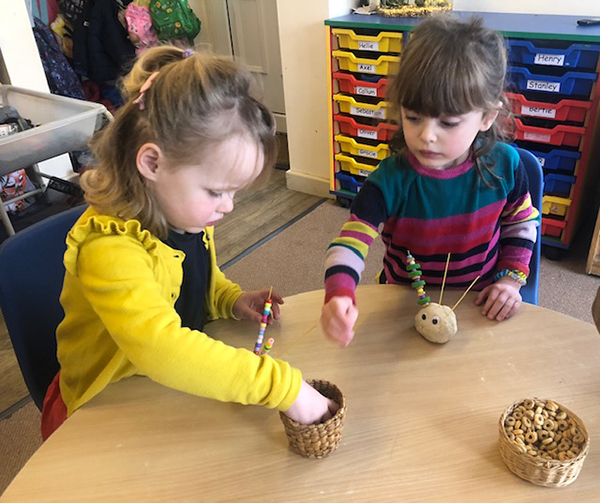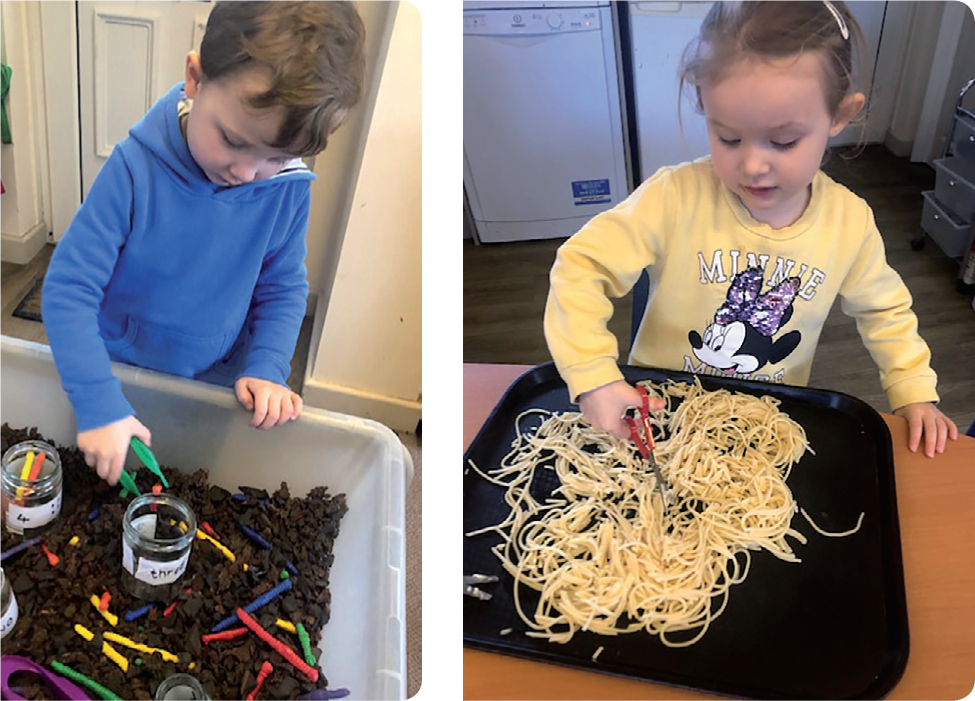Training: All within grasp

Training: All within grasp
The article was originally published in Early Years Educator.
Understanding how physical development links to children's readiness for school is a priority for trainees on the EYITT programme. Sian Marsh describes how one trainee is using the Movement Environment Rating Scale to support colleagues to develop children's fine and gross motor skills.
Physical development plays a huge role in helping children enjoy their early years education and ultimately do well at school.
The ability to complete simple tasks such as sitting still, holding a pencil, using scissors and putting on their shoes is foundational because it also ensures children develop the hand-eye co-ordination they need for writing and the eye movements they need to support reading when the time comes.
In recent years it has become clear that many children are coming into early years settings with far less developed fine motor skills than compared to previous generations and Covid has made things worse. Ofsted recently warned of children's progress falling behind as a result of the pandemic.
‘Children who had limited access to outdoor space while at home had sometimes lost their physical confidence, for example in becoming more hesitant to jump off play equipment,’ the report stated, adding that early years settings were responding to those concerns by ‘promoting physical skills, such as trying to get children out to the park each day, having fresh air and using the big playground equipment.’
The central importance of physical development is reflected in the EYFS curriculum; physical development is about giving young children opportunities to be active and interactive and to develop their co-ordination, control, and movement. Physical development has an impact not only on educational achievement but also on social skills that are vital for children to be successful in their future education.
If children are in time going to be ready to hold a pencil for writing, they need to build strength in their hands and wrists. Children need to practise squeezing, pinching and twisting, as well as their hand-eye coordination. In essence, they need the support of skilled practitioners to train not only their bodies but the links between body and brain.

Dedicated outdoor lead
With apprenticeships providing an increasingly important way of developing staff in early years settings and schools, supporting apprentices to plan and deliver activities to improve physical development outcomes in children has become a necessary focus.
Best Practice Network, which has just launched a new Level 3 Early Years Educator Apprenticeship, works closely with Kids Planet Day Nurseries, England's third largest nursery chain.
Gil Mason, head of training at Kids Planet Training Academy, says that it is acutely aware of the importance of encouraging physical activity for their apprentice learners and children.
To support this Kids Planet has appointed a dedicated outdoor lead, Rhiannon Scott.
‘In the midst of a global pandemic, bringing it back to the good old days of mud pies, climbing trees and making dens is essential for children and staff well-being and physical development,’ Rhiannon says.
‘Outdoor play is a constant thread in all areas and our company vision is very clear. Free flow access to the gardens across all our settings is highly encouraged where possible and the importance of outdoor learning is embedded in practice.
‘Through interactive training delivered through online programmes, apprentices can get an insight into the why of what we do. Our apprentices are learning from countries such as Denmark, where early years children spend the majority of their day in an outdoor setting.’
She adds: ‘The gardens are talked about as an extension of the indoor learning environment and “in the moment” planning is continued outdoors in order to maximise opportunities to support physical development.’
Fine motor skills and play
Andrea Simpkin is the manager of Brookbabes in Bramham, West Yorkshire. Andrea, one of our Early Years Initial Teacher Training (EYITT) programme trainees, is responsible for leading on the curriculum design and implementation in her setting, including supporting the work of apprentices who plan and deliver activities under her direction.
Andrea says: ‘The pre-school team know that play has a vital role in supporting and developing children's fine motor skills. Staff facilitate this play by providing meaningful experiences, materials and guidance in everyday play activities. An active, child-centred approach based on the children's interests and skills is likely to promote positive learning outcomes.’
At Brookbabes practitioners support children's physical development on an individual level.
Apprentices learn about environment rating scales such as ECERS, ITERS and SSTEW, which many settings are using with confidence. The scales view child development from a comprehensive, or global, point of view, examining a wide variety of areas that all contribute to positive child development.
Andrea's setting uses the Movement Environment Rating Scale (MOVERS), created by Carol Archer and Iram Siraj, which assesses the quality of movement experiences and the environment. ‘It has been designed to support staff to develop their subject knowledge about physical development and how it relates to promoting the other inter-related aspects of child development,’ she says.
‘We began to think about what school-ready looks like and reflect on how we could support individual progress enabling all children to have the best possible start,’ she says.
‘Through our recent observations, we noticed that a large proportion of children were really struggling with fine motor movements. After further assessment, it was apparent that we had a significant number of children who found it uncomfortable and unnatural to hold a pencil, a paintbrush for mark-making or to use scissors to make snips in the paper.’
She emphasises the importance of children developing upper body and core strength in addition to fine motor skills: ‘This also supports their ability to develop the skills they need for writing such as sitting at a table.’
The MOVERS definition of physical development encompasses both gross motor skills and fine motor skills.
‘Children require progressive development in their hands to enable them to grasp and hold things and eventually develop their writing skills,’ says Andrea. ‘Just like any muscles children need to train their hand muscles, strengthen them and engage in fine motor activities to get them stronger.’
She adds: ‘We understood the need to develop fine motor coordination, for children to learn to perform basic everyday tasks such as self-care.
‘Being independent in self-care also supports a child in becoming school ready. Before children can learn to have the finger strength and pencil control necessary to write letters, they must develop their smaller muscles.’
Finger gyms
Andrea reports that their children are being helped to build up their foundations for writing with a daily ‘finger gym’, with the challenges changing on a weekly basis. Activities include playdough, pegs and pegboards, jigsaw puzzles, threading, posting and sorting small objects and building with Lego.
‘These activities help to develop strong, flexible fingers, hands and arms,’ she says. ‘They promote better hand-eye coordination, differentiated movement and manual dexterity.
‘Our finger gym fosters children's use and understanding of spoken language. It builds cognitive abilities and provides opportunities to practise self-regulation. The children have access to the planned activity throughout the day.
‘We have also been exploring the musical instruments and encouraging children to help tell familiar stories using finger puppets to support fine motor development.’
Andrea says that their apprentice has been supporting this task.: ‘She has adapted the activity to support or extend each child. As her manager, I have observed that she is gaining an understanding of the process in which the children develop to be able to use a pencil or pen confidently and comfortably showing control.
‘To further develop this activity and encourage parent partnerships, our apprentice has devised some home learning packs to run alongside our finger gym.’
The nursery has also used its online journal platform, Tapestry, to add a post for all parents with information on fine motor development and activities that they can do at home to support this development.
‘We know it might take time for some children to regain their physical skills and catch up in this area of their development,’ says Andrea. ‘However, providing a range of daily physical opportunities both inside and outside of the setting will enable children to consolidate and extend their skills.’
Apprenticeship qualification includes unit on supporting early physical development
Best Practice Network's new Level 3 Early Years Educator apprenticeship programme contains a unit dedicated to promoting children's physical development. This includes a focus on planning and implementing a range of activities for children across the 0-5 age range, challenging the apprentice to demonstrate their understanding of theoretical approaches to the development of children's early physical skills. To find out more go to https://bestpracticenet.co.uk/eye-level3-apprenticeship
Useful resources
Sally Goddard-Blythe: Decline in children's physical readiness for learning
GOV.UK: Covid-19 Series briefings


